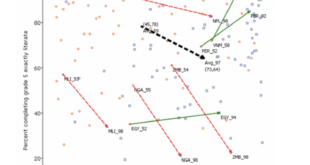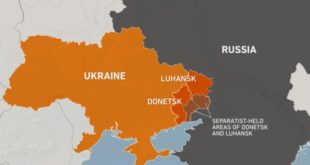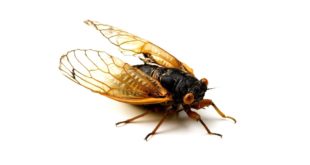Russia is a strategic petrostate in a double sense. It is too big a part of global energy markets to permit Iran-style sanctions against Russian energy sales. Russia accounts for about 40 percent of Europe’s gas imports. Comprehensive sanctions would be too destabilizing to global energy markets and that would blow back on the United States in a significant way. China could not stand by and allow it to happen. Furthermore, Moscow, unlike some major oil and gas exporters, has proven capable...
Read More »The plague year (but not that plague year)
It was about the beginning of September, 1664, that I, among the rest of my neighbours, heard in ordinary discourse that the plague was returned again in Holland; for it had been very violent there, and particularly at Amsterdam and Rotterdam, in the year 1663, whither, they say, it was brought, some said from Italy, others from the Levant, among some goods which were brought home by their Turkey fleet; others said it was brought from Candia; others from Cyprus. It mattered not from whence...
Read More »Let there be light
The universe was born in light. If modern cosmology is right, for the first forty thousand years or so after the Big Bang the most important component in the young, hot universe was electromagnetic radiation, a situation that continued until the universe had cooled sufficiently for the first hydrogen and helium atoms to form. Temperatures were still high enough at that point for the cosmos to be filled with an opaque, glowing plasma. After a few hundred thousand years, as the universe...
Read More »Links I liked
[embedded content] What the Spider-verse sadly missed (above) The anti wordle Great slides on why you should use Poisson regression instead of using log(1+y) Advice from Abby Post on approaching teaching evaluations: I see a lot of faculty members complain about student course evaluations. Let me tell you, I get it. I taught a 4-4 for 3 years with 12 distinct course preps. Here’s what I learned. (1/8) — Abby Post (@AbigailSPost) January 14, 2022 Lee Harris on the case for rapprochement...
Read More »Enrolling more kids in school is easy, teaching them is hard
We use literacy tests in survey data to construct long-term trends in literacy for 87 developing countries, spanning birth cohorts from the 1950s to 2000. We show that over this period literacy rates have increased substantially, but virtually all progress has been due to the increase in access to school rather than any improvement school quality, which we define as the propensity for schooling to generate literacy after five years of schooling. Overall, school quality is low in developing...
Read More »Best nonfiction I read this year, Part II
Continuing from last week, a few more favorites of the past 12 months (none of which were written all that recently). And a reminder that you can sign up to get posts by email. Gods of the Upper Air, by Charles King, alongside Euphoria, by Lily King (and Gillian Tett’s Anthrovision for good measure) Euphoria was my recommendation for best book in 2015. “Pioneering anthropologists in the field, making it up as they go along: The novel,” was my description. It was a thinly-veiled...
Read More »Links I liked
If you like Wordle, you will love Evil Wordle (which keeps changing the word to give you the fewest possible matches) You probably underestimate the wage you can earn elsewhere A summary of the differences in the differences-in-differences literature America’s falling democracy score looks more like politics than political science A flurry of articles on whether the US is headed for sustained insurgent violence (I’m working on a post about why that’s not the risk that worries me most) Dan...
Read More »Should you work for a government you disagree with?
I spoke first to Eric Rubin, a career diplomat since 1985 at the State Department, a former U.S. ambassador to Bulgaria, and currently president of the American Foreign Service Association. He is crystal clear that “you cannot speak publicly against government policy. If you want to do that, you must resign. It’s anti-democratic. It is inappropriate to believe you know better than the people’s elected representatives.” Rubin also believes that resignations rarely have any impact on policy....
Read More »War in Ukraine seems unlikely but, for the US and Europe, peace will taste bitter
If more U.S.-Russia talks are to happen, what should be on the table? Thomas Graham and Rajan Menon, writing in Politico Magazine, attempt to thread the needle of Russia’s Ukraine demands by considering a moratorium on the country’s future NATO membership amid a larger security compromise. “Now is the time to think big and imagine a new, more durable order, one that can encompass Russia,” they write. Others go further, with Anatol Lieven, writing in the Quincy Institute for Responsible...
Read More »Does buying organic save lives?
Pesticides are linked to negative health outcomes, but a causal relationship is difficult to establish due to nonrandom pesticide exposure. I use a peculiar ecological phenomenon, the mass emergence of cicadas in 13 and 17-year cycles across the eastern half of the US, to estimate the short and long-term impacts of pesticides. With a triple-difference setup that leverages the fact that cicadas only damage tree crops and not agricultural row crops, I show that insecticide use increases with...
Read More » Chris Blattman
Chris Blattman




